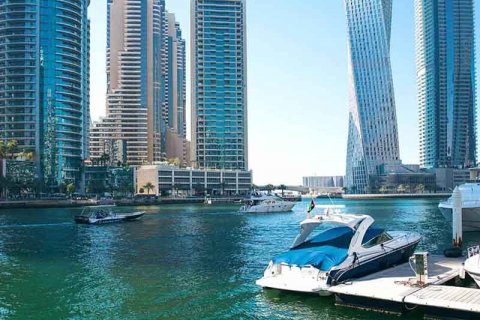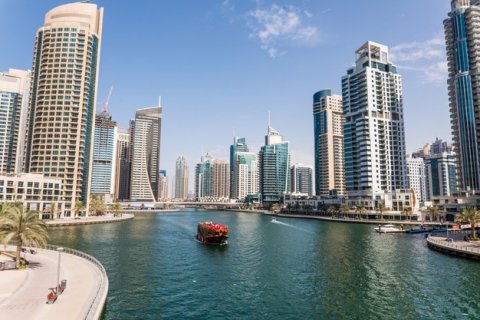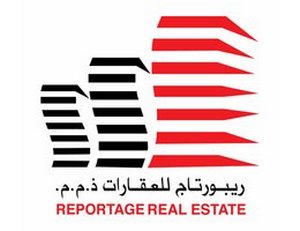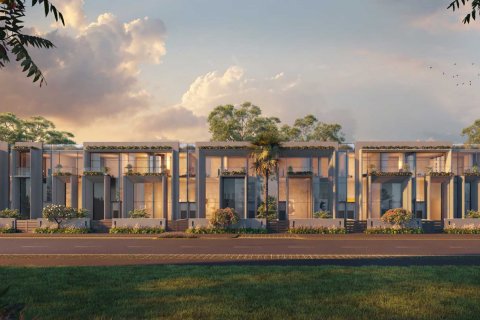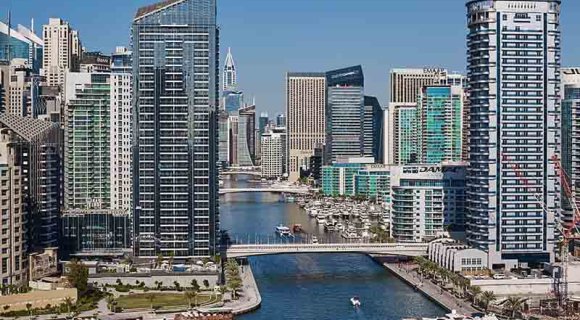
Few people know that in Dubai and other emirates, you can rent an apartment with the option to buy. This type of real estate transaction is known as rent-to-own or rent-to-buy and has become increasingly popular among expats in recent years. Essentially, this scheme is similar to a mortgage but comes with more flexible terms. Many prominent construction companies in Dubai, such as Emaar Properties, Nakheel, Damac Properties, and others, offer apartments and houses for rent with the option to purchase.
Content:
- Dubai rent-to-own vs traditional purchase with a mortgage
- Rent-to-own real estate: advantages and disadvantages
- How do payment plans for rent-to-own work in Dubai
- Regulations for rent-to-own agreements in Dubai and other emirates
- Procedure stages
- Costs associated with Dubai rent-to-own properties
- Market trends and forecasts
- Tips and recommendations
- Conclusion
Dubai rent-to-own vs traditional purchase with a mortgage
For example, you have decided to move to Dubai. Renting a place to live here can be costly, and buying an apartment with your own funds might not be feasible. In such a case, you have the option of using a mortgage or the lease-to-own scheme. Both options are similar in that you gradually make payments toward the apartment where you live. However, these schemes have the following differences:
- With a mortgage, you can only pay off a portion of the cost of the property in Dubai. An initial down payment of 20–25% (for residents) and 50% (for non-residents) must be made in a single payment. In contrast, with rent-to-own schemes in Dubai and other emirates, the initial payment typically amounts to 5–10% of the total, which includes registration fees and commissions. If the tenant doesn't have such funds, they can take out a bank loan.
- A rent-to-own option from the developer gives the buyer the right to withdraw from the deal at any time. For example, if the apartment no longer suits them after a certain period. In such cases, there is usually a penalty to be paid to the development company, but these losses are much smaller than with a mortgage, where it's impossible to cancel the loan.
- Despite the fact that foreigners with a resident visa have the right to take out a mortgage in the UAE, there are cases where banks reject such borrowers due to a lack of credit history. A rent-to-own contract is made directly between the developer and the buyer without involving a bank. Getting approval from the development company is much easier, as even if the tenant stops making payments, the developer can cancel the deal without significant losses.
Rent-to-own real estate: advantages and disadvantages
Among the benefits for sellers of rent-to-own properties in Dubai and buyers, we can name:
- The opportunity to buy an apartment or villa for those who have not yet saved up the amount for the first down payment on a mortgage or installment plan.
- A great alternative to standard renting, which allows you not just to spend money on accommodation but gradually invest it in your own housing.
- The property's price is fixed at the moment of the contract with the development company, even though real estate prices in the UAE constantly rise.
- During the entire period when the potential buyer is considered a tenant, the maintenance responsibilities in Dubai rent-to-own lie with developers. The tenant only pays for utilities.
- The opportunity to test-drive the housing. Throughout the rental period, you can evaluate the advantages and disadvantages of the housing and, if necessary, opt out of the purchase.
When choosing rent-to-own properties in Dubai and other emirates, it is essential to consider some of its drawbacks, including:
- Higher rental rates compared to standard ones. It's important to note that you are paying for the purchase of your own home, and considering the rising housing prices, it can be a good investment for the future.
- In the contract with the buyer, the development company usually sets penalties for canceling the purchase, and sometimes for early payment. Thus, test-driving an apartment in the UAE may incur a certain cost. Read the contract carefully to avoid unpleasant surprises.
- After 3–4 years, the period for paying the main part of the property's cost usually begins. Therefore, before signing the contract, it's essential to assess your ability to make payments or inquire about the possibility of obtaining a bank loan.

How do payment plans for rent-to-own work in Dubai
Renting a home with the option to purchase implies that the buyer pays 20-30% of its cost as rent over the first 3–4 years after the deal. This period is known as the lock-in period. There are no strict regulations regarding the duration, and each developer can set its length as they see fit.
Once the lock-in period is over, the accumulated rental payments automatically convert into the initial down payment. In the next stage, the buyer continues to make contributions until they have completely bought the apartment or house. Developers customize payment plans and terms in Dubai rent-to-own agreements, and taking a loan to cover these payments is not prohibited.
Regulations for rent-to-own agreements in Dubai and other emirates
The rent-to-own contract between the buyer and the developer can come in two types:
- A classic sales contract, specifying a fixed price for the home, along with a plan and payment schedule.
- An option contract, detailing the unit's price and the period within which it must be fully purchased. This scheme involves the tenant-buyer gradually paying the so-called option fee – a set percentage of the total housing price. After the fee is paid, the buyer gains the right to purchase the real estate. If the deal is canceled, the option fee remains with the developer.
All transactions must be registered with the Land Department. The Land Department provides standard contracts and payment schemes. However, each document will have individual amendments, as both parties specify their conditions.
Procedure stages
The process of purchasing rent-to-own apartments in Dubai implies that until the unit is finally purchased, the potential buyer acts as a tenant. Such a deal is somewhat similar to buying off-plan apartments in installments. In Dubai, the registration of the transaction is carried out through the online portal Oqood. To do this, the buyer needs to provide a copy of the contract with the developer, a copy of their foreign passport, or an Emirates ID card if available. The developer independently submits a request to register the transaction on the Oqood portal.
Next, the buyer receives an electronic certificate. Once the purchase is fully paid, this temporary document is exchanged for a title deed.
Costs associated with Dubai rent-to-own properties
The home buyer also needs to cover mandatory fees:
- Real estate ownership transfer fee, amounting to 2% of the housing's value.
- Fee for issuing a title deed – $60.
- Housing registration fee, dependent on the property's price, ranging from $545 to $1,100.
- Service charges – approximately $5.
- Government fee of 0.25% of the rent (for the period when the buyer is the tenant).
If you plan to use the services of a real estate agency, be aware that you will need to pay a fee of 2% of the property's value for the agent's service.
Market trends and forecasts
The majority of the UAE population consists of expatriates. Comfortable living conditions, a high level of security, quality infrastructure, good salaries, and favorable business conditions are some of the factors encouraging foreigners to move to the Emirates for permanent residency. The continuous population growth leads to an increase in property purchase and rental prices, e.g. by the end of 2023, rental rates in Dubai for apartments had increased on average by 15%, and renting a villa became 19% more expensive.
The option of purchasing through the lease-to-own scheme has gained the most popularity in Dubai and Abu Dhabi, as these are the two largest and most developed emirates, where property prices steadily rise.
Analysts predict that in 2024, prices for apartments and villas in Dubai will increase on average by 5–15%. This is due to the stable economy of the country, active infrastructure development, a high percentage of foreign investments, and many other factors.
The option of rent-to-own in Abu Dhabi and other emirates is advantageous for both buyers and developers. It allows developers to reduce excess supply in completed houses and expand the pool of potential customers. Buyers, in turn, get the chance to purchase apartments without significant savings.
Thus, the lease-to-own scheme in the UAE attracts people to the real estate market who had not previously considered buying their own apartment.
Tips and recommendations
When entering into a lease-to-own deal, it is essential to carefully review the contract with the developer. Pay attention to the following details:
- The full property price.
- The rental period.
- The amount deducted from the rent for the initial down payment.
- Penalties and other conditions in case of cancellation.
- The payment schedule and the amount of each installment.
- Additional conditions for early purchase.
- Late rent payments penalties.
Another important thing to consider is that there are restrictions on subleasing rent-to-own property in Dubai. For this reason, such properties are not suitable for investors who want to generate income from rental businesses. In this case, it is better to consider a developer's installment plan.
To find the right home and complete the deal, we recommend consulting professional brokers. Specialists will find the optimal real estate option and help draft the contract to protect your interests.

Conclusion
When choosing housing in the Emirates, it is crucial to turn to trusted professionals. Our website features various property offers from trusted real estate agents and developers. An advanced search filters by location, area, housing type, and other criteria and an option to select prices in different currencies, make it easy to find the right property for purchase.





































